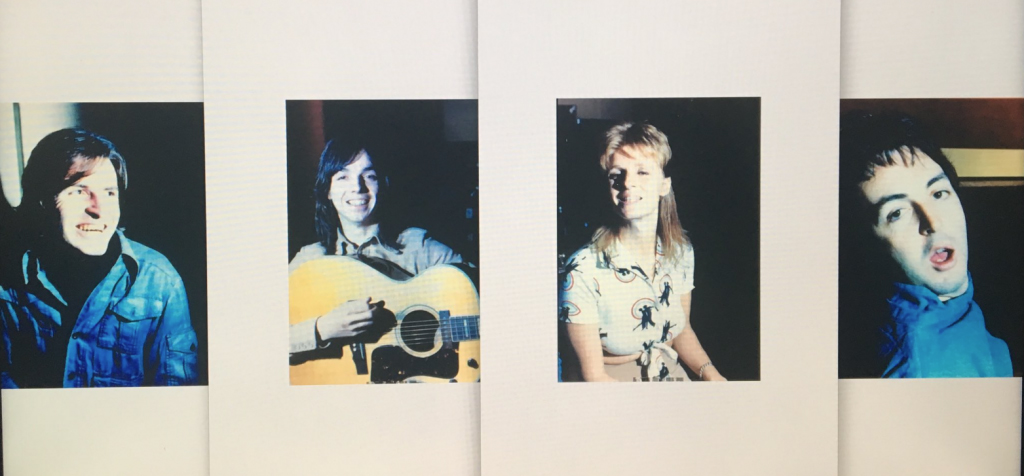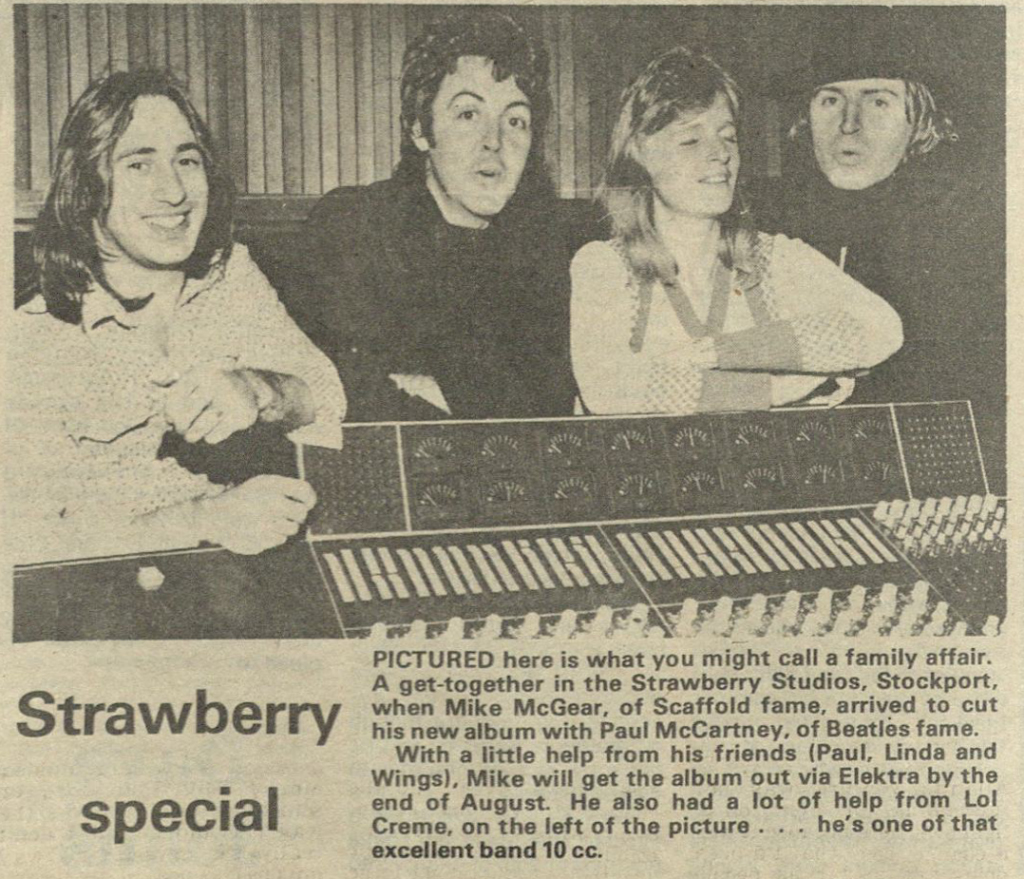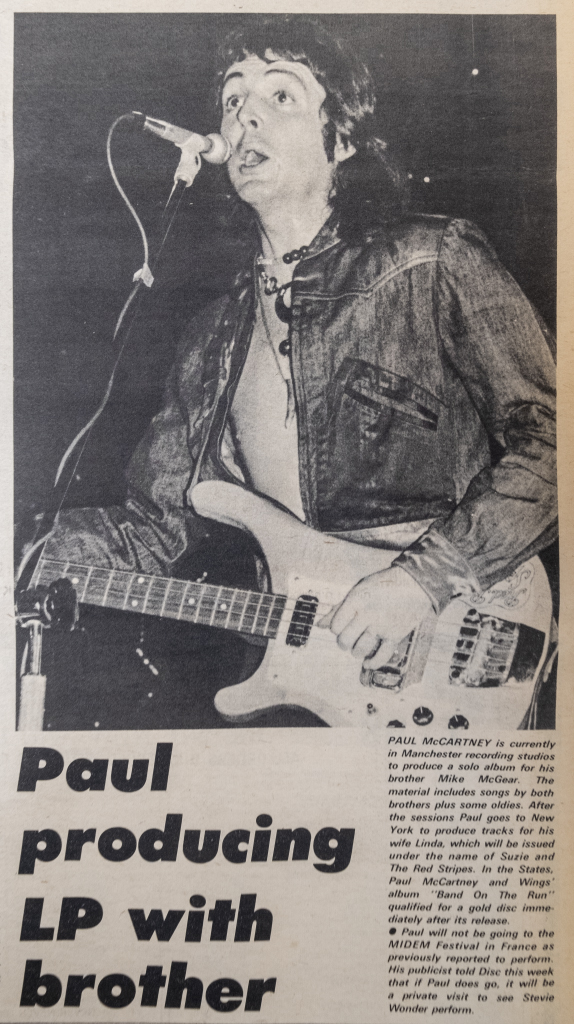January - February 1974
Recording "McGear" album
Last updated on July 25, 2023
January - February 1974
Last updated on July 25, 2023
Recording studio: Strawberry Studios South, Dorking, Surrey
Previous session Dec 13, 1973 • Mixing "Mama's Little Girl"
Article January 1974 • Wings Fun Club newsletter #6 published
Article January 1974 • Paul McCartney and John Lennon hint at potential Beatles reunion
Session January - February 1974 • Recording "McGear" album
Session Circa 1974 • Home recordings (aka "The Piano Tape")
Session Early 1974 • Mixing quadraphonic version of "Band On The Run"
Some of the songs worked on during this session were first released on the "McGear" Official album.
From Wikipedia:
The facility was originally called Inter-City Studios and located above a music store in the town centre. In early 1968 it was bought by Peter Tattersall, a former road manager for Billy J. Kramer and the Dakotas. Tattersall invited Eric Stewart, then lead guitarist and singer of the Mindbenders and later a member of 10cc, to join him as a partner in July 1968. The pair moved to larger premises at No. 3 Waterloo Road in October, with Stewart choosing the studio’s new name in honour of his favourite Beatles song, “Strawberry Fields Forever“. […]
Once launched as a band, 10cc recorded their first four albums at Strawberry Studios. Sheet Music (1974) was recorded at the same time McCartney was producing brother Mike McGear’s McGear album. Gouldman recalled: “We would work in the studios every day from 11am to 5pm and then Paul would come in the evenings. It was a fabulous period, the studio looked absolutely beautiful, full of their equipment and our equipment, there was a lovely creative atmosphere in the studio …
From The Chieftains: The Authorised Biography, by John Glatt:
In early 1972 Paddy Moloney got a call from ex-Beatle Paul McCartney, asking him to come to Stockport In the north of England to record some backing tracks for a new album he was producing for his brother Mike McGear’s solo album.
‘I was delighted when Paul called,‘ Moloney says. ‘The Beatles had just broken up and this was before Wings. I found it fascinating to work with him as I’d never seen recording equipment like that before. We certainly had nothing like that in Ireland. Paul was a genius at work-Ing it. He knew how to twiddle the knobs‘.
After the session Llnda McCartney asked Paddy to pose for a photograph with his uilleann pipes. ‘I remember sitting down and tlying to concentrate on playing the pipes while she was taking my portrait. Linda went wild with the camera and took hundreds of shots‘.

What led up to the recording of the album? You wanted to record again.
It was our kid making the mistake of saying “What are you doing?” I was in between things and I said “Nothing.” He said “Shall we try some music?” and I said “Yes, I do the comedy stuff but yeah I’ll have a go.” I went down to his house in London. We sat around and we came up with this song called “Leave It” coupled with “Sweet Baby” which we did here in this house. That’s how it started. It went down so well with these people in America, the Eastmans there. They were getting us a record deal and playing it to people who said “Hold on, what, you are stopping there? You should do an album.” Paul said, “What are you like on time?” I said “I am doing nothing.” He said “Well I’ve got a period that I can do. Shall we go for an album in Strawberry and come up North.” He has a house up here as well. So we used a setup every day in our car, taking our pate butties with us and little mixture drinks and just go to work in Strawberry, every day.
Mike McCartney / McGear – From The Strange BrewMike McGear McCartney – The Strange Brew, 2016


On January 3rd, Paul Linda and Denny arrived at Strawberry Studios, Stockport, to begin work on the first solo album recorded by Mike McGear. Produced by Paul, the album includes work by him, Mike McGear and Roger McGough.
Musicians featured were Linda, Denny, guitarist Jimmy McCulloch, drummer Jerry Conway and Mike McGear. While in Stockport, Paul and Linda stayed with Paul’s family in Liverpool. McCartney’s party stayed at a nearby Manchester Airport Hotel.
Last week I spoke to Peter Tattersal who engineered the sessions, and has previously worked for Brian Epstein as road manager for Billy J. Kramer and the Dakotas. Pete told me:
“It was incredible when Paul came to the studios, they’d work from 4pm to 5am. There isn’t a clock in the whole place, and the atmosphere is very casual. Other than Neil Sedaka and the Sid Lawrence Orchestra, we haven’t had many big names recording here, usually just college groups making their first demo. It’s a pleasure to work with someone as professional as Paul.
I remember one night, Denny picked up his guitar and started playing some Buddy Holly numbers. We all had a great sing song for about two hours. It was Shrove Tuesday, and we had a little Calor gas stove in the studio. Linda had made us all these incredible pancakes. They were so thin and fluffy. I’ll never forget them. We drank gallons of tea and wine. That was one of the most memorable nights.
Paul’s an amazing producer. There was a very strange number we did off one of the Roxy Music albums. He just brought the album into the studio and said: ‘Right, we’re going to do this one next.’ I’d never heard anything quite like it. I remember thinking, ‘oh, I don’t like that, all those discordant notes.’ But the more you hear it, the more you like it. It’s very clever. Paul was setting down the basic track, and really, I wasn’t sure what he was doing at all. It didn’t sound too right to me. But he has a great quality about him, in that, unlike so many producers, he is able to look ahead. There’s a big orchestral backing to it, and a completely new bass sound. Off the whole album it’s my favourite track.
He’s marvellous the way he deals with musicians. He got this incredible oboe solo out of this middle aged woman. He was sort of egging her on saying ‘yes and bend a note here’, and stuff like that. She was pretty amazed at what she had been able to do. His whole approach, and friendliness, endeared him to the session musicians.
Actually, he was telling me all about Sgt. Pepper. That whole album was amazing when you think that it was recorded on a four track. The Beatles did a hell of a lot for the recording industry. They did things that you didn’t think were possible. You’d sit and listen to their LP’s and marvel. In fact, from ‘Pepper’ onward for three years there was a tremendous growth rate. Nowadays we’ve got thirty-two track recording studios.
I’ve learnt a lot from Paul, and rate myself a more professional engineer since having worked with him. I hope they come back again.”
From Wings Fun Club newsletter N°1, 1974

Written by Bryan Ferry
Recording
Written by Paul McCartney
Recording
Written by Paul McCartney, Mike McCartney / McGear
Recording
Written by Paul McCartney
Recording
Written by Paul McCartney, Mike McCartney / McGear
Recording
Written by Paul McCartney, Roger McGough
Recording
Written by Paul McCartney, Mike McCartney / McGear
Recording
Written by Paul McCartney, Mike McCartney / McGear
Recording
Written by Paul McCartney, Mike McCartney / McGear
Recording
The Man Who Found God on the Moon
Written by Paul McCartney, Mike McCartney / McGear
Recording
Ten Years After On Strawberry Jam
Written by Paul McCartney, Linda McCartney
Recording
Written by Paul McCartney, Mike McCartney / McGear
Recording
Written by Paul McCartney, Mike McCartney / McGear
Recording
Written by Paul McCartney
Recording
Written by Paul McCartney
Recording
Paul McCartney: Music Is Ideas. The Stories Behind the Songs (Vol. 1) 1970-1989
With 25 albums of pop music, 5 of classical – a total of around 500 songs – released over the course of more than half a century, Paul McCartney's career, on his own and with Wings, boasts an incredible catalogue that's always striving to free itself from the shadow of The Beatles. The stories behind the songs, demos and studio recordings, unreleased tracks, recording dates, musicians, live performances and tours, covers, events: Music Is Ideas Volume 1 traces McCartney's post-Beatles output from 1970 to 1989 in the form of 346 song sheets, filled with details of the recordings and stories behind the sessions. Accompanied by photos, and drawing on interviews and contemporary reviews, this reference book draws the portrait of a musical craftsman who has elevated popular song to an art-form.
Eight Arms to Hold You: The Solo Beatles Compendium
We owe a lot to Chip Madinger and Mark Easter for the creation of those session pages, but you really have to buy this book to get all the details!
Eight Arms To Hold You: The Solo Beatles Compendium is the ultimate look at the careers of John Lennon, Paul McCartney, George Harrison and Ringo Starr beyond the Beatles. Every aspect of their professional careers as solo artists is explored, from recording sessions, record releases and tours, to television, film and music videos, including everything in between. From their early film soundtrack work to the officially released retrospectives, all solo efforts by the four men are exhaustively examined.
As the paperback version is out of print, you can buy a PDF version on the authors' website

Notice any inaccuracies on this page? Have additional insights or ideas for new content? Or just want to share your thoughts? We value your feedback! Please use the form below to get in touch with us.